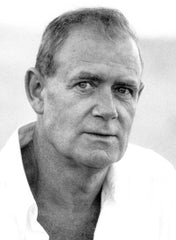Colin Bright
 Contrary to Australia’s other leading composers, Colin Bright is essentially self-taught. His early involvement in socio-political issues and his interest in Aboriginal music led to him to adopt Peter Sculthorpe as a mentor through the early seventies.
Contrary to Australia’s other leading composers, Colin Bright is essentially self-taught. His early involvement in socio-political issues and his interest in Aboriginal music led to him to adopt Peter Sculthorpe as a mentor through the early seventies.
Colin Bright has since received Composer Fellowships, International Fellowships and commissions from most of Australia’s leading ensembles and his music has been performed and broadcast in 27 countries around the world.
He was awarded a 2 year Composer Fellowship from the Music Board of the Australia Council, 2003-4.
The composer writes:
‘The major influence on my musical thinking is PSYCHE OF PLACE (landscape, space, sun, etc.). There is nothing nationalistic in my music. It is about awareness of place - where you live and how you fit in.’ My current preoccupation could generally be described as: - URBAN PSYCHOSCAPES - more internal/psychological states. So far, these pieces involve finding something of the essence of a writer/poet (and sampling their voice), which, when integrated with the music adds a theatrical or meta-musical dimension.’
‘His early work often includes didgeridoos (Earth Spirit 1982, Fire on the Lake 1989 etc.) or concentrates on creating a true Australian sound (Red Earth 1985) culminating in the opera The Sinking of the Rainbow Warrior (1993/94). More recently, a number of different works have emerged in which the focus gradually shifts towards what the composer calls ‘urban psychoscapes’. These pieces seek to find the essence of a writer/poet (including sampling their voice) in order to open up meta-musical and theatrical dimensions (War and Peace 1994, The Wild Boys 1996, Black Years – Red Years 1997/98, Ratsinkafka 2000, Let the Storm Break Loose 2004). His literary sources so far have included Jas Duke, Amanda Stewart and W. S. Burroughs. The Sinking of the Rainbow Warrior was performed as part of the Sydney Festival in 1997 and has since been released on CD (VAST028-2). The Wild Boys was awarded Best Composition of the Year at the Sounds Australian Awards in 1997 and was selected as the Australian entry for the 1997 Paris Rostrum. Black Years – Red Years won the NSW award for Best Composition at the 2000 Sounds Australian awards. Let the Storm Break Loose was short-listed for Best Composition at the 2005 Sounds Australian/APRA awards. The Last Whale was awarded Best Composition by an Australian Composer - 2008 Classical Music Awards.
Colin Bright is also a Performer and Improvisor. It was his early experiments in improvisation and open-form structures that lead him to more formal composition.' Roland Peelman (The Song Company) 2010.
www.brightmusic.net
Photograph by Bridget Elliott
